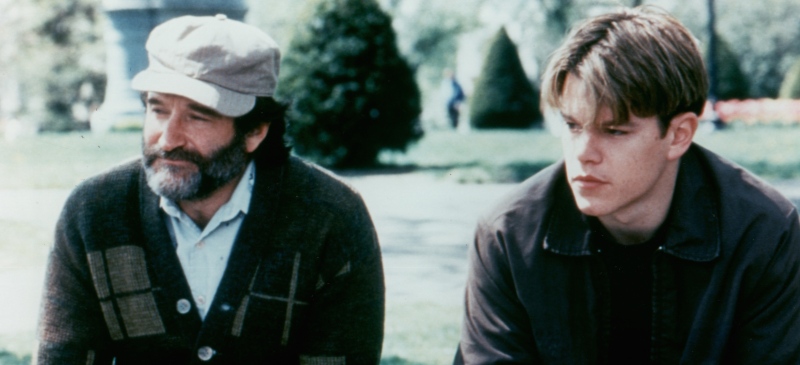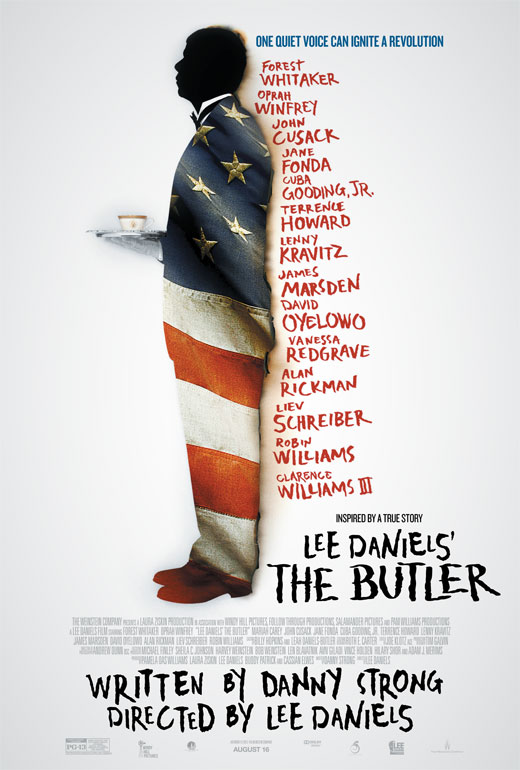Director: Lee Daniels. Follow Through/Weinstein/Salamander et al (12A)
DRAMA

Cast & Credits
Producers: Lee Daniels, Cassian Elwes, Buddy Patrick.
Writer: Danny Strong.
Camera: Andrew Dunn.
Music: Rodrigo Leao.
Sets: Tim Galvin.
Forrest Whittaker, Oprah Winfrey, John Cusack, Jane Fonda, Cuba Gooding Jnr., Terrence Howard, Lenny Kravitz, James Marsden, David Oyelewo, Vanessa Redgrave, Alan Rickman, Liev Schrieber, Robin Williams, Clarence Williams III, Mariah Carey, Alex Pettyfer.
SYNOPSIS
Seen through the eyes of butler Cecil Gaines (Whittaker) who serves five US Presidents from Eisenhower to Ronald Regan, the Civil Rights movement impacts on America, from the peaceful minded sit-ins that garner initial headlines to the more confrontational actions of the Black Panthers. Cecil maintains a dignified, apolitical stance throughout, despite the involvement of his troubled son (Oyelewo).
REVIEW
American cinema, like American society, has a chequered past in terms of confronting race relations. From the vast, blockbuster epics that romanticised slavery and the ‘Old South’, the antebellum genre of The Birth of a Nation (1915) and Gone With the Wind (1939), the vague, fluffy apologia of Intruder in the Dust (1949), Pinky (also 1949 – clearly year for it) through to the likes of In the Heat of the Night (1967) to the rare, hard-hitting likes of Mississppi Burning (1988) and Spike Lee’s output after this, there has been a fitful desire to look deep into the issues at hand on screen.
We are now four years in to the tenure of the U.S.A.’s first ever African-American President (he gets name-checked toward the end too) and new political eras tend to usher in artists who wish to reflect the societal changes this can bring.
With this in mind, a brace of films are being released into the mainstream that are tackling/talking about racism and its invidious effects head on, such as the soon to be released 12 Years a Slave as well as the much anticipated biography of Nelson Mandela. They look to be more hard-hitting than this slightly reserved offering from Daniels (The Paperboy, 2012).
Reserved in that there is a certain sugar-coated casing to the messages being propagated. The annoying use of soft-focus photography during the early scenes making one blink as if watching the film through saccharine contact lenses. The photography is glisteningly well utilised throughout, like that of Gone With the Wind, but in this case frustratingly detracts from the very serious events chronicled. There was a concern in this reviewer that we may be subject to the type of broken-backed Hollywood-ised exploration of racism that American cinema has veered toward so often in the past.
The characters too seem to be holding themselves back somewhat – Carey’s characters is raped by her ‘owner’ Pettyfer, an act not seen and which leaves her so emotionally unbalanced that she never vocalises a word again, but here is represented only by the swiftest of screams. Her husband does nothing, not even a grimace at what he cannot prevent. Whittaker has enormous dignity in the title role, but perhaps too much – what does it take for him to scream the house down after hearing umpteen racist viccistiudes at work? Surely no one can be this saintly?
But there is grit in amongst the candy-floss visuals and Daniels lets his camera interrogate some harrowing scenes in looming close-up, the restaurant sit-in and the preceding racism training sequences; a terrifying bus ride hijacked by the Ku Klux Klan and, even more horrific, President Lyndon B. Johnson (Schrieber) taking a dump and asking for prune juice as he tries to pass a motion.
The last point also highlights the smart humour that peppers the script. Lines such as “We have no tolerance for politics at the White House” raise a good few laughs. The frequent use of the ‘N-word’ is enough to pull you up out of your seats, it’s prevalence, never over done, is slightly depressing when one considers that co-star Winfrey has been largely instrumental in eradicating this ghastly word from polite conversation. Writer Strong, however, needed a script editor with more balls to rein in the Presidents-as-narrative-structure approach as he hurtles through the premiers at an alarming and panic attack-inducing rate.
Of the performances, Winfrey reminds those of us who do not recall or who haven’t seen her in films such as The Colour Purple (1985 and for which she was Oscar nominated as Best Supporting Actress) just how much of a powerful actress she can be. As Whittaker’s alcoholic, adulteress wife, she is gregarious, voluptuous and fragile as the wife neglected by her advancement oriented spouse. Oyelewo complements this with an impressively rebellious turn as her revolutionary son. There are telling, fun turns from Gooding Jnr., Kravitz and particularly Howard as Winfrey’s lover. Redgrave has a small but punchy cameo at the beginning as Pettyfer’s chillingly practical mother who does the kindest thing for the young Cecil and makes him a house servant after his family is destroyed.
Only Whittaker could have played this role bringing, as he does to every part he plays, the right mix of gravitas, humour and sense of moral purpose to his character. Cecil is, as Martin Luther King notes toward the end of the film, no servile man but one who has in his own small way helped pave the way for African Americans to achieve equality by breaking down certain stereotypes that white Americans hold about them. He is a joy to watch and the ending, as someone attempts to direct him to the President’s office, is a smasher.




